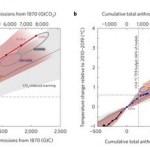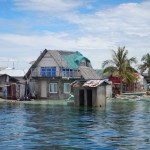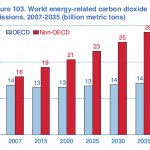Consequences
Much is being made of a new paper in Nature Geoscience in which the authors recalculate "Emission budgets and pathways consistent with limiting warming to 1.5 °C." Whether the authors are justified in their marginally optimistic conclusions — and there's plenty of debate about that — there really isn't much in the way of policy guidance here. Just look at this money quote in Nature:
“The Paris goal of 1.5 °C is not impossible — it’s just very, very difficult,” says lead author Richard Millar, a climate researcher at the University of Oxford, UK.
Or as Millar and his colleagues put in in their…
“The monitoring of the atmosphere, of the surface of the Earth, of what’s going on in the ocean and under the ice — all of that is overwhelmingly funded by the federal government.”
— Former Obama science adviser John Holdren
The other day a friend of mine who works in Beijing as a foreign correspondent suggested that of all the acts of stupidity committed by Donald Trump since assuming office, the thing that bothers him the least is the decision to withdraw from the Paris climate change agreement. Haven't we actually moved beyond relying on government to reduce carbon emissions? he asked. Isn…
The release of carbon dioxide to the atmosphere by the burning of fossil fuels is, conceiveably, the most important environmental issue in the world today.
— "Costs and benefits of carbon dioxide," Nature, May 3, 1979
Actually, the scientific understanding of the dangers posed by rising CO2 levels date back much further — at least 100 years — but 1979 was a watershed year, with all sort of reports and high-level meetings organized in response to the growing recognition that we had a serious problem on our hands. Since then, no major corporation, government or organization can justify being…
The number of people who still aren't worried about climate change — or the number of voters willing to elect someone who feels that way, which is pretty much the same thing — is still depressingly high. But many others have long since moved on to the practical issues of how to respond to the consequent ecological disruption. This category includes scientists, artists, captains of industry, and those who are actually charged with dealing with the myriad problems involved. They all seem to be coming to the same conclusion: humans would rather stay at home and adapt rather than…
In what New York Magazine is calling the most-read article in the publication's history, David Wallace-Wells writes about what will happen if we don't stop burning fossil fuels soon. In a nutshell: the climate "will now go to war with us for many centuries, perhaps until it destroys us."
This has made more than a few climatologists rather cross. The argument is that because "The Uninhabitable Earth" focuses on an unlikely worst-case scenario, and therefore might needless scare the public into inaction.
There are a few questionable statements regarding the…
Among those who spend their working lives and/or spare time worrying about climate change, there are many subjects that still provoke heated debates, so to speak. Chief among them is the wisdom or folly of turning to natural gas as a "bridge" between the carbon-intensive oil- and coal-dominated present and the clean renewable future that we all know is coming sooner or later. The opponents just found their case a little bit stronger thanks to another controversial issue: nuclear power.
Natural gas is, as anyone with a basic grasp of the fundamentals of greenhouse gas forcings can tell you,…
The other day I found myself looking for reading material in a clinic waiting room and for the first time ever I picked up a copy of Bloomberg Businessweek. It's not that I never used to care about business. I just found business publications and business journalists rarely demonstrated a decent level of understanding of the forces behind the financial numbers that dominated their reports. (And yes, I include The Economist in that generalization.)
But BBW was different. The edition contained a half dozen science, environment and technology stories that tweaked my interest and all of them were…
OK, no one can predict a specific weather event months in advance. But what we can do is anticipate expected frequency of events. Back in February of this year, Nature Climate Change published a paper, Physically based assessment of hurricane surge threat under climate change, (PDF bypasses Nature's paywall) that predicted more frequent storm surges for New York City thanks to the changing climate.
Here's the abstract:
Storm surges are responsible for much of the damage and loss of life associated with landfalling hurricanes. Understanding how global warming will affect hurricane surges thus…
Maybe it's just me, desperately searching for optimistic signals in the noise that dominates the mainstream coverage of climate change, but could there be something happening out there, something attesting to a new, more mature interpretation of the challenge facing society at large?
Item 1: The Economist publishes an impassioned lament. This from a magazine that for so long seemed althogether disinterested in the subject:
A HUNDRED years from now, looking back, the only question that will appear important about the historical moment in which we now live is the question of whether or not we…
The thing about the "Durban Platform for Enhanced Action," is that it simultaneously manages to both exceed expectations and demolish any remaining hope for real action. In effect, it tells us everything we need to know about geopolitics of climate change.
As the name implies, this is an agreement for further negotiations. The basic idea is the world will talk for another four years, with the ultimate goal of some kind of undefined "legal" agreement on reducing greenhouse gas emissions beginning in 2020. Given how far apart are the developing and developing worlds on who is responsible for…
Compare and contrast:
The team's new examination of the paleo-climate record now shows that "a global warming of a couple degrees Celsius would basically create a different planet," Hansen warned. It's different than the one that humanity, that civilization knows about. If we look at the paleo record, the target of two degrees Celsius is actually a prescription for long-term disaster." [Source]
and
I think that we look at two degrees as an important and serious goal which ought to guide what we do ... it ought to inform our sense of what needs to be done. It might well cause us or anybody…
I would be remiss if I didn't direct your attention to a new paper in Science that concludes, however tentatively, that the global climate may not be as sensitive to rising atmosheric CO2 levels as everyone has assumed. It is, after all, a rare dose of optimism in a field that has been characterized by "it's worse than expected" findings for pretty much its entire history.
"Climate Sensitivity Estimated From Temperature Reconstructions of the Last Glacial Maximum" appeared last week on American Thanksgiving, thus managing to avoid much in way of media coverage. Science has put it behind a…
Word is Canada will give the world a lump of coal tar for Christmas:
Canada will announce next month that it will formally withdraw from the Kyoto Protocol, CTV News has learned.
The Harper government has tentatively planned an announcement for a few days before Christmas, CTV's Roger Smith reported Sunday evening.
Given the Canada was never on track to come anywhere close to achieving its Kyoto target of a 6% reduction in greenhouse gases relative to 1990 levels, the only consequence of the decision will be political rather than climatological. It's worth noting that it looks like the…
"Major storms could submerge New York City in next decade" cries a randomly selected mainstream media outlet over a story about a new report warning residents that climate change could make life difficult in the not-too-distant future. The report, from the New York State Energy Research and Development Authority, is pretty standard stuff for those who have been paying attention to the growing link between global warming and extreme weather. And maybe it will spur New Yorkers to take the subject a bit more seriously.
But there's a certain set who will welcome this 600-page conpendium of…
It's hard to argue against funding scientific research. But let me try.
This past week 18 experts assembled as the Task Force on Climate Remediation Research released the product of its collective wisdom. A creation of the Bipartisan Policy Center, which the New York Times' Cornelia Dean describes as "a research organization based in Washington founded by four senators — Democrats and Republicans — to offer policy advice to the government," the task force concluded that the U.S. should be spending unspecified sums on research into what is colloquially known as climate hacking. Most everyone…
The good folks at the National Snow and Ice Data Center summarize the season in the Arctic Ocean. Turns out that the weather conditions that helped make 2007 a record for low sea-ice extent didn't recur. And yet, 2011 came within a relative hair's breadth of setting a new record. That means longer-term climate trends are to blame, not seasonal weather variation. The low-down:
Why did ice extent fall to a near record low without the sort of extreme weather conditions seen in 2007? One explanation is that the ice cover is thinner than it used to be; the melt season starts with more first-year…
More than a few writers have gotten a lot of mileage out of comparing the tobacco and fossil-fuel industries' propaganda efforts to counter rapidly rising mountains of science that counter their "it's all good" message. Al Gore featured it in his slide show. Naomi Oreskes and Erik Conway wrote an entire book, Merchants of Doubt.
The fact that not only were the denial tactics similar, but so are some of the PR firms and even individuals involved makes for compelling storytelling. But maybe we haven't taken the analogy far enough. Über-foodie Michael Pollan just wrote a piece in The Nation that…
Fill in the blanks:
It is customary in the popular media and in many journal articles to cite a projected _________ figure as if it were a given, a figure so certain that it could virtually be used for long-range planning purposes. But we must carefully examine the assumptions behind such projections. And forecasts that ________ is going to level off or decline this century have been based on the assumption that the developing world will necessarily follow the path of the industrialized world. That is far from a sure bet.
That comes from an essay at Yale's e360.
Given that you're reading a…
The title of this post won't mean much until you read this contribution to The Conversation, a new and laudable attempt by climatologists to get out the message that time's a wastin,' folks. Here's a taste:
We're only a few decades away from a major tipping point, plus or minus only about a decade. The rate at which the ice sheets would melt is fairly uncertain, but not the result that says we are very close to a tipping point committing to such melt and breakdown.
...
Is it irresponsible or "alarmist" of climatologists to point this out? The science brief for policy is not to prescribe…
David Appell at Quark Soup draws our attention (via Stoat) to a graph in the recent America's Climate Choices report from the NAS/NRC. If the forecasts on which the authors rely come to pass, it's going to take almost a couple of decades for U.S. energy-related CO2 emissions to return to post-recession levels. Sounds like good news.
Two years ago, Lester Brown at the Earth Policy Institute wrote of a watershed moment, and while it looks like he was a bit too enthusiastic -- long-term, carbon emissions still rise -- he might have been on to something.
The United States has ended a century of…


